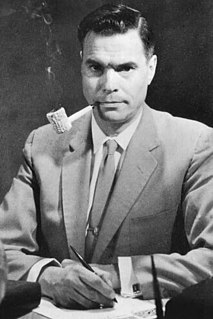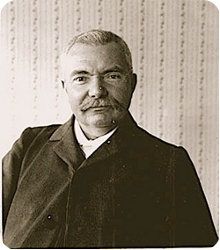A Quote by Adolf Hitler
A man who knows a thing, who is aware of a given danger, and sees the possibility of a remedy with his own eyes, has the duty and obligation, by God, not to work 'silently,' but to stand up before the whole public against the evil and for its cure.
Related Quotes
A man who knows a thing, recognizes a given danger, and sees with his own eyes the possibility of a remedy, damned well has the duty and the obligation not to work 'silently', but to stand up openly against the evil and for its cure. If he does not do so then he is a faithless, miserable weakling who fails either from cowardice or from laziness and incompetence....Every last agitator who possesses the courage to defend his opinions with manly forth-rightness, standing on a tavern table among his adversaries, accomplishes more than a thousand of these lying, treacherous sneaks.
It is not given to man to know the whole Truth. His duty lies in living up to the truth as he sees it, and in doing so, to resort to the purest means, i.e., to non-violence. God alone knows absolute truth. Therefore, I have often said, Truth is God. It follows that man, a finite being, cannot know absolute truth. Nobody in this world possesses absolute truth. This is God's attribute alone. Relative truth is all we know. Therefore, we can only follow the truth as we see it. Such pursuit of truth cannot lead anyone astray.
A man may go into the field and say his prayer and be aware of God, or he may be in Church and be aware of God; but if he is more aware of Him because he is in a quiet place, that is his own deficiency and not due to God, Who is alike present in all things and places, and is willing to give Himself everywhere so far as lies in Him... He knows God rightly who knows Him everywhere.
When there exists anywhere a state of suffering, a wrong, a condition of affairs that men of feeling deplore and that troubles the conscience of the upright, to become resigned to it is wicked. Although the evil flaunts itself before our eyes, and no remedy is in sight, we must go and seek a remedy. In the creation of the God of Justice, evil can be but a transitory state.
The typical atheist rebels against God as a teenager rebels against his parents. When his own desires or standards are not fulfilled in the way that he sees fit, he, in revolt, storms out of the house in denial of the Word of God and in scrutiny of a great deal of those who stand by the Word of God. The epithet 'Heavenly Father' is a grand reflection, a relation to that of human nature.
A priest is a man vowed, trained, and consecrated, a man belonging to a special corps, and necessarily with an intense esprit de corps. He has given up his life to his temple and his god. This is a very excellent thing for the internal vigour of his own priesthood, his own temple. He lives and dies for the honour of his particular god. But in the next town or village is another temple with another god. It is his constant preoccupation to keep his people from that god. Religious cults and priesthoods are sectarian by nature; they will convert, they will overcome, but they will never coalesce.
A man becomes spiritual insofar as he lives a spiritual life. He begins to see God in all things, to see His power and might in every manifestation. Always and everywhere he sees himself abiding in God and dependent on God for all things. But insofar as a man lives a bodily life, so much he does he do bodily things; He doesn't see God in anything, even in the the most wondrous manifestations of His Divine power. In all things he sees body, material, everywhere and always - "God is not before his eyes." (Ps. 35:2)










































